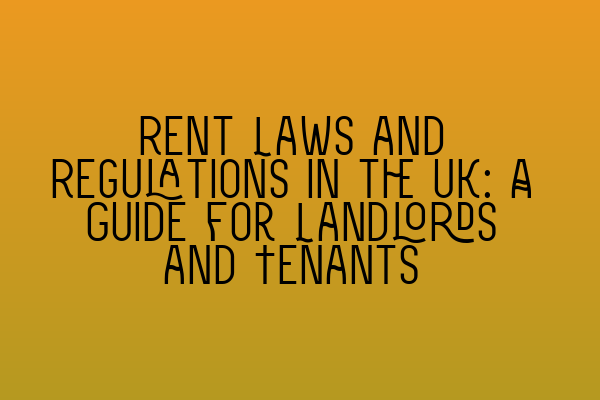Rent Laws and Regulations in the UK: A Guide for Landlords and Tenants
Renting a property can be an exciting venture, whether you are a landlord looking to generate income or a tenant searching for a place to call home. However, it is important to understand the various rent laws and regulations in the UK to ensure a smooth and fair renting experience for both parties involved. In this guide, we will explore key aspects of rent laws that landlords and tenants should be aware of.
Types of Tenancies
Before diving into specific rent laws, it is essential to understand the different types of tenancies in the UK. The two main types are:
- Assured Shorthold Tenancy (AST) – This is the most common type of tenancy in the UK and is often used for private residential properties. ASTs can be fixed-term or periodic and provide certain rights and responsibilities for both landlords and tenants.
- Assured Tenancy – This type of tenancy provides the tenant with stronger rights and security of tenure. Assured tenancies are less common and are typically offered by housing associations and local authorities.
Understanding the type of tenancy you have or are looking to enter into is crucial as it determines the rights and obligations of both parties involved.
Security Deposits
When renting a property, landlords often request a security deposit from tenants to safeguard against any potential damages or unpaid rent. The amount of the deposit should be clearly stated in the tenancy agreement.
It is important to note that landlords are legally required to protect the tenant’s deposit in a government-approved deposit protection scheme. Failure to comply with this requirement can result in serious penalties for the landlord.
Tenants should carefully inspect the property upon moving in and note any existing damages in a thorough inventory. This will help prevent disputes when it comes time to return the deposit at the end of the tenancy.
Rent Increases
If you are a tenant, it is essential to be aware of the rules around rent increases. Landlords cannot arbitrarily increase rent during a fixed-term AST unless there is a specific clause allowing for it in the tenancy agreement.
For periodic ASTs, landlords must provide written notice to tenants before increasing the rent. The notice must comply with the statutory requirements, including the specified notice period, which varies depending on the frequency of rent payments.
If you believe the proposed rent increase is unreasonable, you have the right to negotiate with your landlord or challenge it through formal procedures if necessary.
Rights and Responsibilities
Both landlords and tenants have specific rights and responsibilities under UK rent laws. Here are some key points to keep in mind:
- Landlord’s Responsibilities: Landlords are responsible for ensuring the property meets certain safety and health standards, maintaining necessary repairs, and providing tenants with necessary documentation such as gas and electrical safety certificates.
- Tenant’s Responsibilities: Tenants are expected to take care of the property, report any necessary repairs promptly, pay rent on time, and respect the terms outlined in the tenancy agreement.
It is crucial for both parties to understand and fulfill their obligations to maintain a positive and legally compliant tenancy.
Ending a Tenancy
When a tenancy comes to an end, whether it is a fixed-term AST or a periodic AST, certain procedures must be followed. The notice period required to end a tenancy varies depending on the circumstances, such as the length of the tenancy agreement and the grounds for eviction.
It is crucial for both landlords and tenants to familiarize themselves with the proper procedures and timelines to ensure a smooth transition at the end of the tenancy.
If a landlord wishes to regain possession of the property before the end of the tenancy, they must have valid grounds for eviction and follow the proper legal procedures to do so.
Seek Professional Advice
Renting a property can sometimes be a complex process, and it is always wise to seek professional advice when dealing with rent laws and regulations in the UK. Consulting a solicitor who specializes in property law can provide invaluable guidance and ensure that you are aware of your rights and obligations as either a landlord or tenant.
At SQE Property Law & Land Law, we have a team of experienced solicitors who can assist you with understanding and navigating the intricacies of rent laws in the UK. Contact us today to schedule a consultation and ensure a smooth renting experience.
Related Articles:
